Before long, though, she and Caleb broke apart like cheap china when he insisted he was heading for that San Diego job after his fill-in sheriffing was done.
Only now Caleb appeared to be settling into that post, the Trinidad city fathers having lavished him with money and perquisites enough to convince him to stay on. But Willa and this man she still loved — though she would not admit that to anyone, herself included — had no real reason not to fit the broken pieces of their relationship back together.
Other than her pride.
And maybe his.
Her immediate thought upon seeing him this morning was that he had come to see her off. She was only going to nearby Las Vegas, New Mexico, to catch the train to Denver; it wasn’t like she was leaving for good — a few weeks at the most. But him saying good-bye would mean something.
Then from out of the hotel, carrying a carpetbag, emerged Raymond L. Parker. The tall, white-haired, white-mustached businessman, about fifty, looked typically distinguished in his double-breasted, gray-trimmed-black Newmarket coat, lighter gray waistcoat, and darker gray trousers. That’s what he’d worn to Willa’s father’s funeral, she recalled, though with a white top hat and not today’s western touch of an uncreased, broad-brimmed gray Stetson.
Raymond Parker had been partner to George Cullen, her late father, in establishing the Bar-O. But Parker had cashed out after a time, looking for big-city challenges that he’d handily met. Mr. Parker had established businesses all across the Southwest — Kansas City, Omaha, Denver — owning restaurants, hotels, and even several banks, including the one here in Trinidad, where lately he’d been spending a good deal of time, during which he and Caleb had become good friends.
And that seemed to be who Caleb had come to see off. They were smiling and chatting.
Willa heard the approach of heavy footsteps and turned to witness a slender yet full-bosomed woman of perhaps twenty-five making her way toward the stage. Those heavy footfalls were not this young woman’s, of course — they belonged to Deputy Tulley, who was making his bandy-legged way along sand-covered Main Street, hauling two carpetbags.
He was following after the lovely, dark-haired Rita Filley, proprietress of the Victory Saloon. She was attired in what struck Willa as just about what a saloon-owning female would consider appropriate travel wear — a yellow-gold dress with a floral brocade bodice, puffed sleeves, fitted waist, crinkled satin underskirt, ruffled overskirt, with touches of black fringe, silk flowers, and feathers.
Willa didn’t know whether to be horrified, amused, or pitying. But annoyed said it best, Willa knowing this creature would be accompanying her on the Las Vegas run. In Miss Cullen’s defense, it must be said that she was not generally a snob. But Willa had heard the rumors that Caleb York occasionally called on Miss Filley in her upstairs suite of rooms.
In her more generous moments, Willa might admit that she was pleased the new owner of the Victory (Rita Filley had inherited it from her late sister, Lola, about whom similar rumors concerning Caleb York’s upstairs visits were bandied in town) had shut down the brothel aspect of the saloon. Now the girls who worked there were strictly available for dances and main-floor company, for the cost of a drink or two. What had been the tiny bordello bedrooms had been opened up into lavish living quarters for the mistress (so to speak) on the place’s half an upper floor.
Hearing spurs and footsteps coming down the stairs from the boardwalk, Willa turned and was pleased to see Caleb approaching. She showed no reaction, not wanting to appear forward. He tipped his hat — or rather touched his hat brim — and moved past her to help his deputy with the saloon owner’s bags.
Feeling a red flush come to her cheeks, Willa turned away, not wanting Caleb to see her response. She heard Caleb and Rita talking, though not making any of it out, and then Caleb was just behind Willa, passing the Filley woman’s bags up to Gus, the plump guard’s face showing strain under his floppy, shapeless hat.
“Pleasant journey, Miss Filley,” Caleb said, and Willa heard him opening the door for her. He was probably helping her up and in, too, but Willa didn’t turn to give him the satisfaction of her noticing.
Parker was coming down those hotel stairs. He gave Willa a big smile, tipped his hat — really tipped it — and said, “Well, what a pleasure it will be, traveling with two such lovely ladies.”
Willa managed a smile as he slipped past her, to hand up his own bag to Gus. Then she realized Caleb was standing beside her. He had a funny little smile going. What the dickens did he have to smile about?
He touched his hat brim again, nodding.
“Ma’am,” he said to her.
Then he joined Tulley, and they headed to the sheriff’s office.
Ma’am!
What kind of insulting nonsense was that?
Parker was waiting for her. His interest in her was strictly fatherly, and with her real father gone, that was comforting. He helped her up into the stage next to Rita Filley. Then he got up and in himself, sitting in the middle of the bench-like, leather-covered seat opposite. He took off his hat and set it next to him.
“We’ll ride in comfort today,” he said.
“These Concord coaches,” the Filley woman said, “are much smoother than the Overlands.”
“They are,” Parker agreed, “but I was referring to the roominess this ride will provide. Even this smaller coach can accommodate six passengers, and there will be only four of us, I understand.”
A gravelly voice from the window on the hotel side said, “Only three.”
It was Norval Bratcher talking, the stagecoach driver. Parker looked out at the whip, who was checking his pocket watch.
Bratcher was a man of average height and build in a gray flat-brim hat that had once been white, and a gray handlebar mustache that had once been brown. He wore an ancient leather jacket over a dingy red-and-black-plaid shirt; his denims were faded into no color at all.
“Just the three of us?” Parker asked the driver.
“Jest you three. Fourth ticket belongs to that feller that the sheriff shot the toes off of last night. Him and his six or seven toes remainin’ are languishin’ in a cell at the jail. So stretch out and relax, folks. You’re the whole shebang.”
Bratcher smiled brownly and spit tobacco.
This crudity barely registered on Willa, who had been around cowboys and their ilk as far back as her memory went. And Rita Filley likely knew even more about men and their disgusting ways.
Willa did not recall ever having spoken to the Filley woman, though she’d seen her on occasion. The woman and some of her girls had even come to Willa’s papa’s funeral, which she thought was a respectful thing for them to do, if something of an embarrassment. So when Rita turned to her and nodded, well, Willa nodded right back. It was the Christian thing.
“Miss Filley,” Parker said, his smile big but not so big as to seem flirtatious, “where is it you’re off to? Las Vegas itself or points north?”
“Denver,” she said. Her voice was femininely high-pitched with something of an affected purr, at least to Willa’s ears. “A shopping expedition. I need to pick up some things for myself, and my girls.”
“Denver is where we are headed, as well,” Parker said, with a nod toward Willa.
The big brown eyes in the somewhat dark-complected oval face got even bigger, as they swung toward Willa. “Oh, are you and Miss Cullen traveling together?”
“Not exactly,” Parker said quickly, apparently realizing he might have given the wrong impression. “The branch line that will be going in this spring, connecting Trinidad and Las Vegas...? I’m sure you’re aware that Miss Cullen is negotiating with the Sante Fe Railroad to provide the necessary passage through the Bar-O for that spur.”
Читать дальше





![Микки Спиллейн - Death of the Too-Cute Prostitute [= Man Alone]](/books/437201/mikki-spillejn-death-of-the-too-thumb.webp)